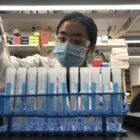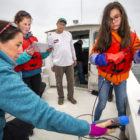Environmental Health
Beyond COVID-19: Waste Testing A Vast Public Health Frontier
|
As scientists measure the prevalence of COVID-19 in the sludge flowing from New Haven sewage treatment plants, they’re also finding that our biological waste can tell them much more about our collective pathologies. Between March 19 and June 30, a group of scientists tested waste that had previously been used to detect COVID-19, looking for drugs and chemicals. The researchers found significant increases in three opioids, four antidepressants, and other chemicals in sludge from New Haven. The analysis, by scientists from the Connecticut Agricultural Experiment Station (CAES) and Yale University, offered the first glimpses of how the pandemic’s stay-at-home orders affected people’s behavior. It also underscored how important human waste can be as a resource for understanding public health and society’s habits.

